![]()
“The world is the geologist’s great puzzle-box; he stands before it like the child to whom the separate pieces of his puzzle remain a mystery till he detects their relation, and then his fragments grow at once into a connected picture beneath his hand.”— Louis Agassiz
A geology degree is associated with strong job growth and good salaries. According to the Bureau of Labor Statistics, Geoscientists make $91,130 per year, while Hydrologists make $79,370. These estimates are generally based on a bachelor’s in geology, and with a master’s in geology, your salary could be higher.
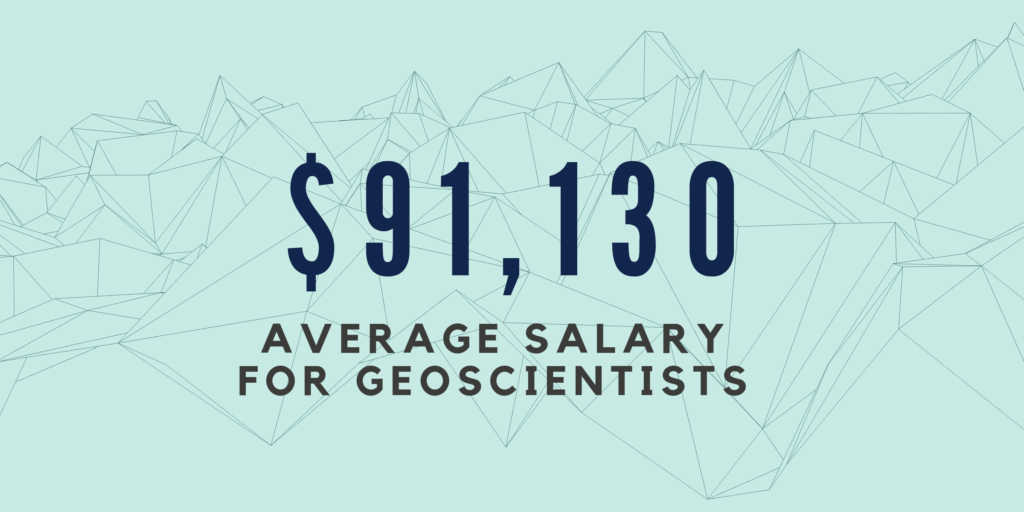
Geology is also a profession with a certain level of job security in the tech age. Geologists work with lots of technology, from software programs to high-tech tools, and you’ll need to be comfortable with using evolving technology in order to work in geology. But while many jobs are being outsourced or automated, the role of geologist requires a combination of hands-on, on-site work and experience-based analysis that simply cannot be well replicated by a computer or conducted remotely.
There are geology jobs in mining, energy, environmental issues, water management, research, and education. But geology work isn’t for everyone. Geology work requires analytical thinking, facility with math, tech-savvy, communication skills, patience, and physical stamina. If you have these qualities, you may be right for a geology career, and for that, you’ll need a geology degree. Geologists can find work with a bachelor’s, master’s, or doctorate degree. Read on to learn the ins and outs of geology classes, degrees, and geology careers.
Jump To:
- What is Geology?
- How is Geology Different from Earth Science?
- What Classes Will I take for a Degree in Geology?
- What Can I do with an Associate’s in Geology?
- What Can I do with a Bachelor’s in Geology?
- What Can I do with a Master’s in Geology?
- What Can I do with a PhD in Geology?
- Can I Earn a Degree in Geology Online?
- What is the Job Market with a Geology Degree?
- Is a Degree in Geology Right for Me?
What is Geology?
The word “Geology” is derived from the Ancient Greek roots “earth” and “study,” and means the examination of the solid Earth, including its composition, and physical history. Geologists study how the Earth was formed, how it has changed over time, and the physical properties of its surface and underlying layers, including how humans can make use of them. Geology is concerned with the composition and ages of features like rock layers, as well as the processes that shape them. Geologists may study specific items like rocks, mineral deposits, or volcanoes, or systems such as fault lines and erosion patterns. Geologists also study the geological properties of other bodies like moons, planets, and asteroids.
Geology is not an academic discipline that operates in a vacuum; it informs a number of other sciences and has important practical applications for human society. Geology provides a basis for understanding other sciences, such as explaining how continental drift allowed human ancestors to migrate from one area to another. The evolution of life can also be understood through the fossil record left in the Earth’s rocks, as can the history of the Earth’s climate. Geologists can apply their knowledge to help humans discover, extract, and manage resources like aquifers, mineral deposits, and natural gas. They can also help engineers learn how to construct cities and bridges safely on the underlying land, and to help developers understand and plan for natural hazards such as fault lines, volcanoes, sinkholes, and landslides.
Geological research is also important for the future of human life on Earth. Geologists on climate, erosion, and water management, have shown how human activity has threatened our planet’s ability to support life. The work of geologists has not only exposed these problems, but can offer tools to remediate them. For instance, geologists work to project the impact of floods on land or the frequency of landslides so that cities can plan to build safer structures. Geologists are also in demand for green jobs identifying the best sites for wind farms, solar plants, and geothermal energy.
In their work, geologists perform a number of job duties:
- Plan and execute field studies, which involves visiting sites to take samples and conduct surveys.
- Analyze evidence gathered in the field, which may include rock samples, well logs, aerial photographs, or well logs extracted through drilling.
- Conduct lab tests on samples gathered in the field.
- Create geologic charts and maps based on survey measurements.
- Draft and present scientific reports to peers, non-scientist team members, clients, or the public.
How is Geology Different from Earth Science?
Geology is often spoken of in the same breath as Earth Science. Many schools also offer degrees in Earth Science alongside, or in place of, geology. This can cause confusion and lead many geology degree seekers to wonder about the difference between geology and Earth Science.
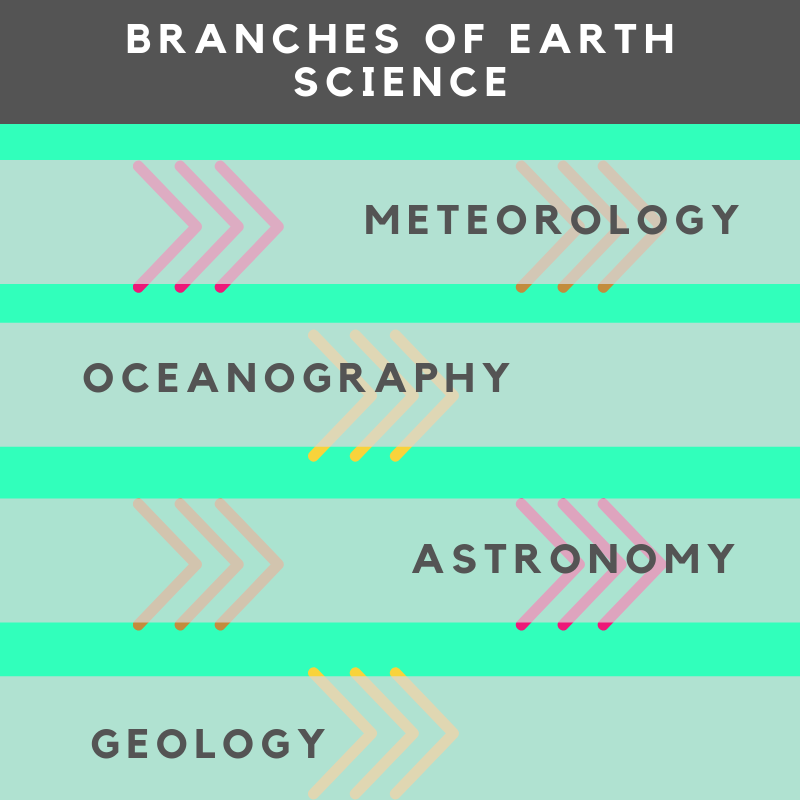
As it turns out, geology is one of several branches of Earth Science. The other branches of Earth Science are meteorology or atmospheric science (the study of climate and weather patterns), oceanography or hydrology (the study of oceans and bodies of water), and astronomy (the study of bodies in space). All four branches are natural sciences concerned with the physical properties of planetary bodies, usually Earth.
Geology isn’t just an earth science, it’s also considered one of the historical sciences, along with paleontology, archaeology, cosmology, astronomy, and history. That’s because geologists work to date rocks and geological features, and to understand how they were formed, usually in the distant past, through measurable physical evidence.
Another source of confusion is the term “geotechnical engineering.” Geology is closely related to, but separate from, geotechnical engineering. This term actually refers to a branch of engineering that concerns the effect of geological materials on engineering projects, such as how well land may be able to support a highway built on it. Along with civil engineering, geotechnical engineering has applications in mining, military, and petroleum fields, where construction on or below the ground takes place.
What Classes Will I take for a Degree in Geology?
Every school has its own geology degree curriculum, with different areas of focus or concentrations offered. Sometimes, these may relate to the local resources available, such as the study of plate tectonics in California, fossils in Wyoming, or volcanoes in Hawaii. When looking at a geology degree curriculum, it’s also important to recognize that many schools offer courses with the same content under different titles. A few of the most common courses in geology offered include:
- Introduction to Geology
- Geophysics
- Plate Tectonics and Geodynamics
- Earth History
- Geomorphology
- Crystallography & Mineralogy
- Metamorphic and Igneous Petrology
- Structural Geology
- Sedimentology
- Surface Processes
- Stratigraphy
- Invertebrate Paleontology
- Field Geology
Outside of geology classes, you’ll complete coursework in chemistry, and physics, which will provide a strong basis for understanding the physical properties of geological materials and the dynamic processes that act on them. You’ll also take classes in math to give you the ability to perform quantitative analysis on geological data. Most programs will also provide training in the specific software programs used by geologists today.
Outside of the classroom, most quality geology degree programs will have you do plenty of hands-on learning. This will take the form of laboratory work, where you’ll learn to measure and test rocks, minerals, and soil samples, as well as field work, where you’ll learn to collect samples, take measurements, and conduct surveys. These hands-on experiences will make you familiar with the tools and methods used by professional geologists in their daily work and build your practical skills. You’ll also likely complete some sort of internship or practicum, where you’ll gain experience in a professional business or other organization. Your practicum in geology will help you learn about the geology industry from the inside, show you workplace norms, expose you to career tracks, and help you start to build a professional network.
Once you’ve completed your geology classes and gained a degree, you may need to also gain a geology license before you can practice. A total of 31 US states require geologists to be licensed in order to perform public service projects (such as those associated with civil engineering). In these states, you’ll need to prepare for and pass the National Association of State Boards of Geology (ASBOG), Fundamentals of Geology Exam (FGE), and also meet the ASBOG’s education and experience requirements.
What Can I do with an Associate’s in Geology?
Associate’s degrees in geology are offered by several schools, mainly state and community colleges, which can be quite affordable, especially for local students. But an associate’s in geology is best thought of as a step on the path towards a bachelor’s in geology, rather than a stand-alone degree. That’s because most geology jobs require a bachelor’s degree as a minimum job requirement.
An associate’s degree typically takes two years to earn on a full-time basis, and the curriculum for an associate’s in geology will cover geology fundamentals like Structural Geology, Sedimentology, and Surface Processes. With an associates degree in geology, you’ll be qualified for jobs like:
<p/p>
- Research Assistant
- Quality Control Inspector
- GIS Technician
- Cartographer
If you’d like to broaden your career prospects, you may wish to go on to earn a bachelor’s in geology by completing about two additional years’ coursework. If you earned your associate’s in geology from a community college, you may be able to seamlessly transfer your credits to an affiliated geology program at a nearby state school, if the two hold an articulation agreement.
What Can I do with a Bachelor’s in Geology?

Most schools offering a bachelor’s in geology award this degree as a bachelor of science. This not only reflects the fact that geology is a science discipline, but also indicates that this is an applied degree. That is, you’ll be learning all about the ins and outs of the practice of geology, and won’t need to complete the liberal arts requirements (such as English, History, and Foreign Language) that are part of a typical bachelor of arts degree.
A bachelor’s in geology will typically take four years to earn on a full-time basis. You’ll usually complete about 40 courses for your degree, with requirements in math, chemistry, physics, and, of course, geology. You’ll also have a certain number of electives (usually about four courses) to enroll in areas of personal interest to you. Many bachelors in geology programs offer the opportunity to pursue a concentration, such as:
- General Geology
- Geospatial Technology
- Geophysics
- Environmental Geology
Many schools also include a capstone experience, based around field work, or an internship, which can provide you with valuable professional experience and contacts. A concentration in a particular area of geology, along with internship experience in that same area, can be a big asset when seeking geology jobs upon graduation.
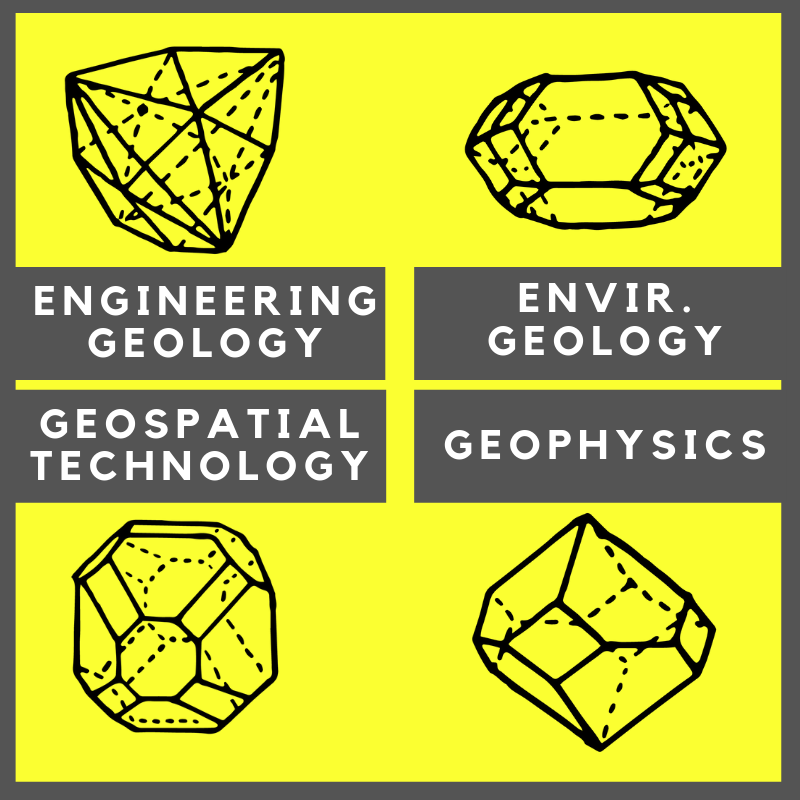
With a bachelor’s in geology, you can pursue jobs as a full geologist. Depending on your areas of interest and experience, you may be a good fit for roles like:
- Geoscientist
- Geochemist
- Hydrogeologist
- Geophysicist
- Wellsite geologist
- Geotechnical engineer
What Can I do with a Master’s in Geology?
While a bachelor’s in geology can get your foot in the door for most geology jobs, there are quite a few which require a master’s in geology, and those that do not actually require a master’s usually give preference to the with this advanced degree when hiring. A master’s in geology can open the door to jobs with more responsibility, more autonomy, and higher salaries. According to Forbes, a master’s in geology is associated with an average salary of $104,400.
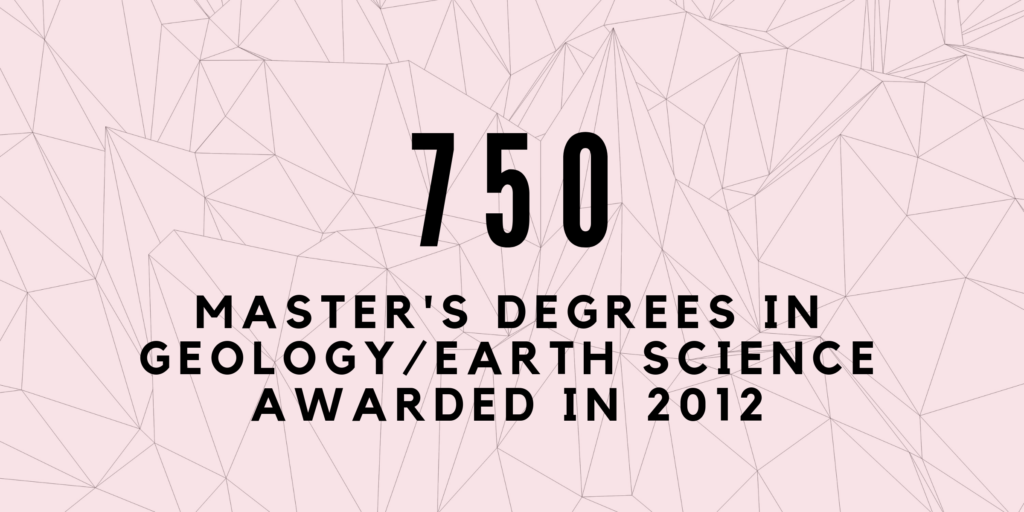
In order to earn a master’s in geology, you’ll need to have already earned a bachelor’s in geology or a related field, such as earth science, paleontology, or chemistry, and complete any program prerequisites that your undergraduate degree may to gave covered. Most master’s degrees take two years to earn, although an Accelerated Master’s Degree Program can be finished in as little as 18 months, while a part-time program takes longer.
Many of the job titles associated with a master’s in geology are the same as those open to the with a bachelor’s in geology, but in a supervisory role. With a master’s in geology, you can expect to oversee projects and manage teams in geology work. You’ll also be qualified to teach geology at the university level as an adjunct professor.
What Can I do with a PhD in Geology?
A PhD is a terminal degree, representing the highest possible degree, and most advanced expertise. In order to earn a PhD, students must prepare, write, and defend an original thesis. This means they will need to find a question in the field which has not yet been answered, conduct original research to address it, draft a lengthy and rigorous paper to answer this question, and defend their findings before a panel of experts. The entire process can take from 3-7 years, depending on your pace if completion. Many PhD students work as teaching fellows or research assistants at their university while completing their PhD.
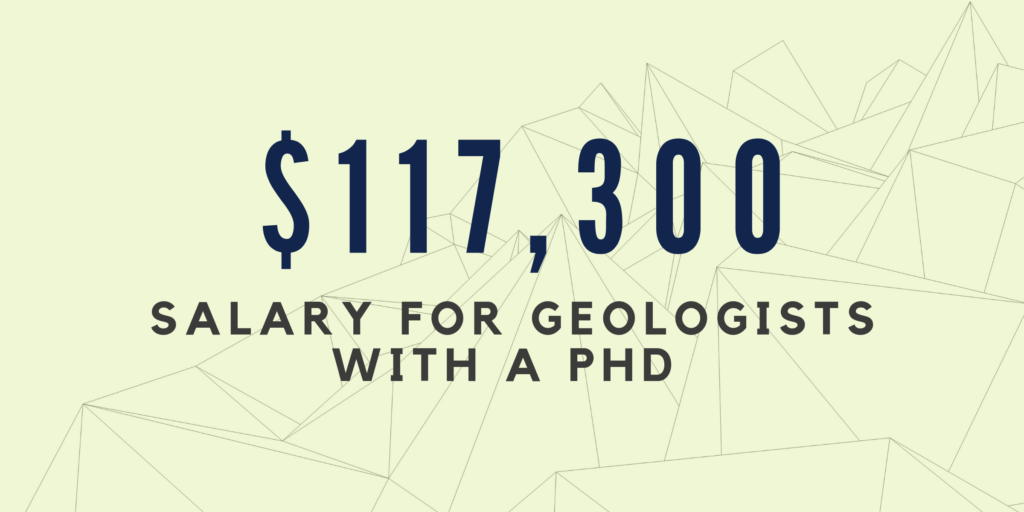
In most fields, a PhD is a step on the path to a career as a tenured professor. This is certainly true of geology as well; you can find work as a geology instructor at colleges and universities, and will be eligible for tenure track positions with a PhD. But as a highly credentialed researcher, you can also gain access to the tier of professional positions in the government and private sector, with the potential to lead important projects and take home a hefty salary. Forbes reports that the starting salary with a PhD in geology is $117,300. This impressive salary rises even higher with experience, and Forbes reports that those at the very top- with a PhD and 25+ years’ experience, earn an average of $248,000 per year!
Can I Earn a Degree in Geology Online?
A growing number of today’s students are looking for online degrees. This is in part because more people need to maintain jobs while taking college classes, and because many people are going back to school to finish degrees or change careers later in life. In the case of online geology degrees, another reason may be the availability of local geology programs. Not every area has a school with a strong geology program, or access to the specializations students might want, and an online geology degree allows students to enroll in the type of program they want without having to relocate.
Fully-online geology degrees are generally aimed at students interested in careers in geology education or environmental policymaking. Those interested in careers involving geology fieldwork, such as research or mineral exploration, will want to look for a hybrid geology degree program. A hybrid program combines some of the distance-learning classes of an online geology degree with on-campus classes or immersions (such as week-long intensives or a summer program). A hybrid on-campus/online geology degree will give you the opportunity to carry out hands-on learning in labs and in the field, and to practice skills like sampling and testing in person.
What is the Job Market with a Geology Degree?
Geology has historically been a cyclical field, tied closely to the market prices of resources like petroleum and minerals. This is still the case to a large extent, but a growing number of jobs related to climate change and green energy have also added to job demand for geologists, and started a shift away from non-renewable resources. In particular, the Bureau of Labor Statistics has cited growth in ‘green energy’ jobs for geologists, planning and identifying geologically sound places for the construction of wind and solar plants.
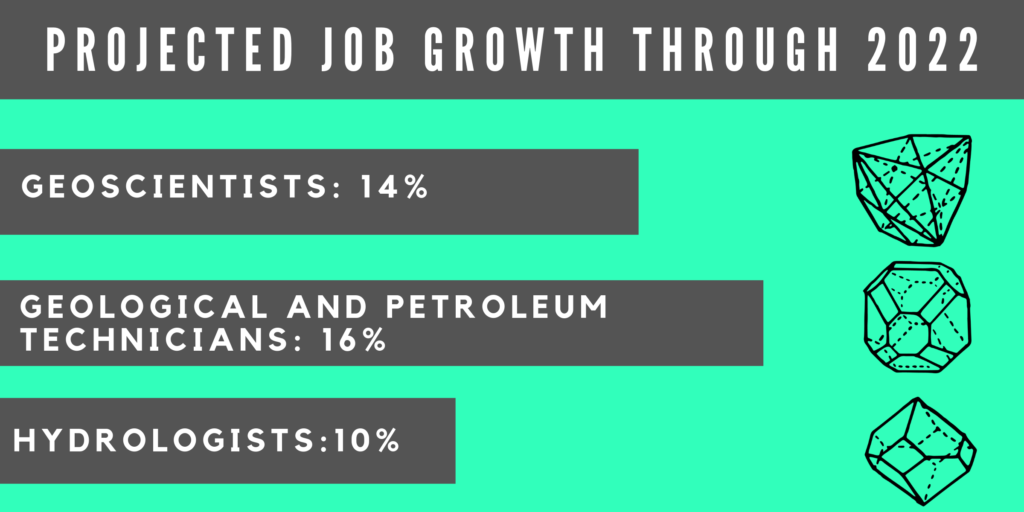
According to the Bureau of Labor Statistics, the US will have open jobs for 11,400 geologists over the next 10 years, based on the expected retirement off 6,900 current geologists and 4,500 newly-created geologist jobs. All of this adds up to a rate of job growth that the BLS categorized as “faster than average,” with particularly high demand in the specialized field of Geological and Petroleum Technicians. Geology jobs are fairly well-distributed throughout the nation, with especially high demand in the states of Texas, California, and Colorado.
Is a Degree in Geology Right for Me?
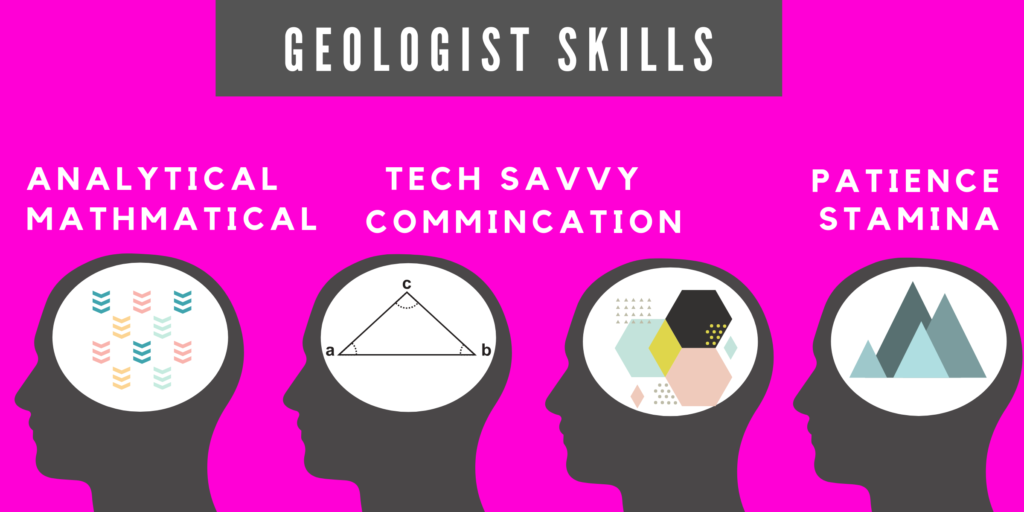
A geology degree is not the right fit for everyone. To succeed in this academic discipline and in the profession, you’ll need a unique combination of analytical skills, physical stamina, and facility with communication. Unlike many scientists, most geologists don’t simply sit in front of a computer all day. They spend plenty of time conducting surveys and taking samples in the field. For many, spending time outside in all weather conditions and traveling to work sites is a major perk. If you prefer the air-conditioned comfort of office work, this may not be the field for you.
To succeed as a geologist, you’ll need to have a strong interest in hard data, the ability to crunch numbers, and the patience and thoroughness required for close study of specimens and samples. Beyond these analytical skills, you’ll also need to have strong written and verbal communication skills. That’s because geologists usually work in teams with other geologists and scientists, and alongside professionals in related fields like environmental science, engineering and chemistry. They also need to convey their goals and findings in clear, understandable language to non-scientists, including civic planners, politicians, and developers. Meetings, lectures, and reports are a big part of the work of a geologist.
If you are interested in working with the Earth’s resources and have this particular skill set, you could have a stimulating, rewarding, and lucrative career ahead of you in geology.
Further Reading:
- What Degree Does a Mining and Geological Engineer Need?
- What are the 5 Best Careers in Environmental Science?
- Top 10 Online Bachelor’s Degree Programs in Environmental Science
- Top 10 Highest Paying Social Science Careers
- What Are the Highest Paying Jobs with a Degree in Mining and Geological Engineering?
- What is the Benefit of a Degree in Environmental Science vs Environmental Design?
- 30 Great Outdoor Jobs Requiring a College Degree
- What Classes Will I Have to Take for a Degree in Petroleum Engineering?
- Top 10 Online Bachelor’s Degree Programs in Environmental Science
- What Can I Do With a Degree in Science?
- 50 Best Online Degrees for 2019
- 23 Fastest Online Bachelor’s Degree Programs
- 20 Best Degree Programs for Undergraduates
- Top 25 Fastest Online Doctorate Degrees
